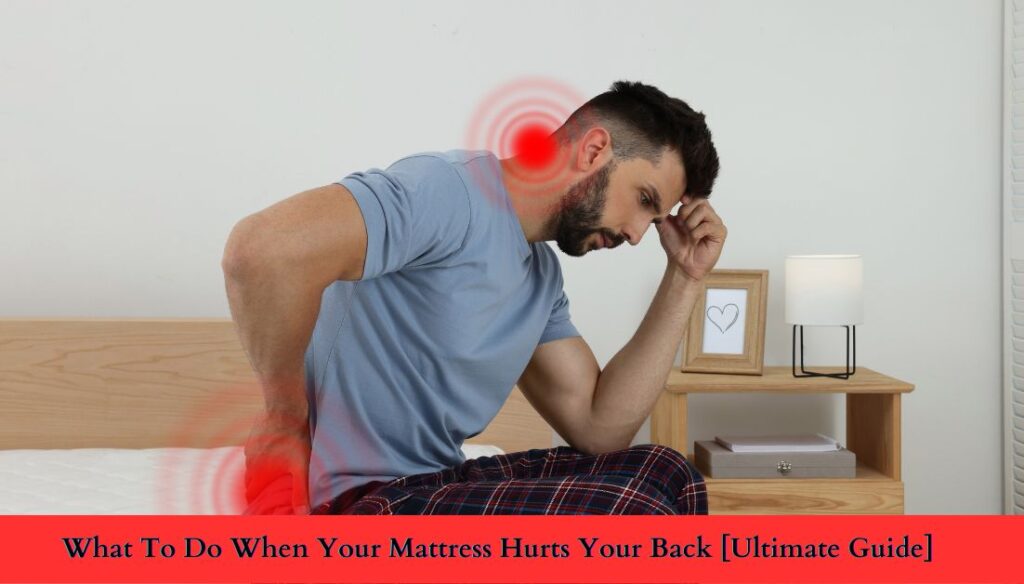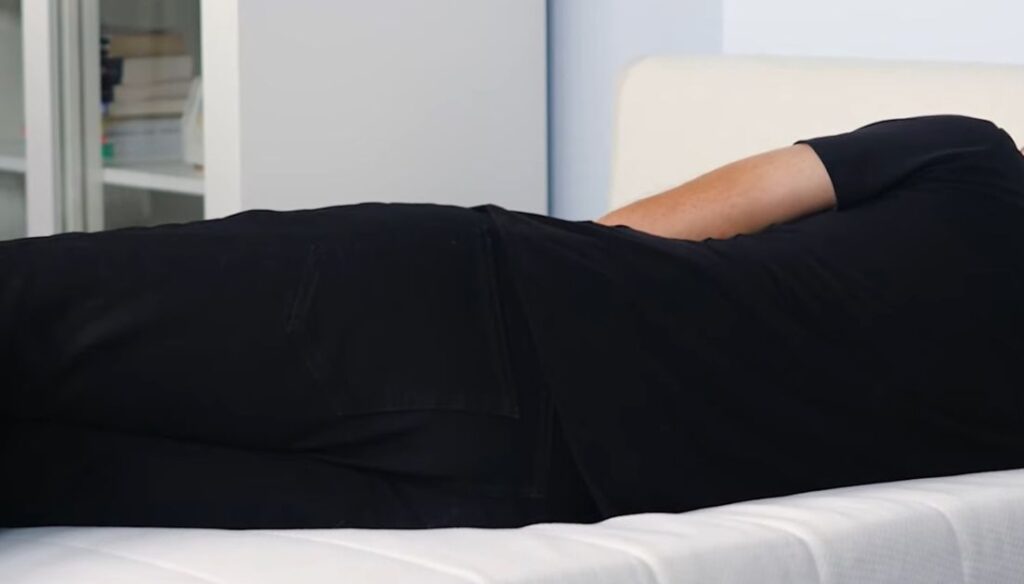Last Updated on October 31, 2023 by nilSSidhajag
There are a few things “What to Do When Your Mattress Hurts Your Back.”
- Firstly, make sure that you are using the correct type of mattress for your body type. There are different types of mattresses that cater to different body types, so find one that suits you specifically.
- Secondly, check your sleeping position. If you sleep on your stomach or back, it might be causing additional strain on your spine and thus causing pain.
- Thirdly, invest in a good quality mattress protector. This will help to extend the life of your mattress and also protect it from any spills or stains.
- Finally, if all else fails, consult a chiropractor or physiotherapist who can help to assess the situation and recommend the best course of action for you.
If you’re waking up with a sore back, it might be time to reevaluate your mattress. A good mattress should provide support and alignment for your spine, but if yours is causing pain, it’s time for a change. Here are a few things to look for in a new mattress:
Firmness: A firm mattress will offer the most support for your back and help keep your spine in alignment. If you sleep on your side or stomach, you might prefer a slightly softer mattress so that your hips and shoulders don’t sink too deeply into the bed.
Material: Memory foam mattresses are often recommended for people with back pain because they contour your body and provide pressure relief.
If you prefer a traditional spring mattress, look for one with pocketed coils that can minimize motion transfer between sleepers.
Warranty: When you’re spending hundreds (or even thousands) of dollars on a new mattress, you want to be sure it’s going to last. Look for a warranty that will cover defects or sagging over time so that you can get your money’s worth out of your investment.
My Bed Is Killing My Lower Back

If you’re among the millions of Americans who experience back pain, you may be wondering if your mattress could be to blame. While there’s no definitive answer, experts say that a mattress that’s too soft or too hard can contribute to lower back pain.
If your mattress is more than 7 years old, it’s probably time for a new one. When shopping for a new mattress, keep these factors in mind: .
- Firmness: A mattress that’s too soft can cause your spine to fall out of alignment. On the other hand, a mattress that’s too hard can make it difficult to get comfortable and can also put a strain on your spine. Look for a mattress that offers both support and comfort.
- Size: It’s important to have enough room to move around on your mattress. If you’re sharing the bed with a partner, make sure you both have enough space so that you’re not constantly disturbing each other during the night.
- Sleep position: Your sleep position (on your side, stomach, or back) can affect how comfortable you are on different types of mattresses.
Why Does My Back Hurt In Bed, But Not On Couch
If you’ve ever experienced back pain that seems to worsen when you lie down in bed. but not when you’re sitting on the couch, you may be wondering what’s going on. Here’s a look at some possible explanations for this phenomenon.
One possibility is that your mattress is to blame. If it’s too soft or too firm, it can put a strain on your back and make sleeping uncomfortable. It’s also possible that you have poor sleep posture, which can exacerbate existing back pain.
Another possibility is that you’re simply more aware of your back pain when you’re lying down because there’s nothing else to focus on. When you’re sitting on the couch, for example, there are other distractions like the TV or conversation that can take your mind off of your discomfort.
If back pain is keeping you up at night, it’s important to see a doctor to rule out any serious underlying causes. In many cases, simple lifestyle changes like switching to a new mattress or improving your sleep posture can make a big difference in relieving nighttime back pain.
Memory Foam Mattress Causing Back Pain

Memory foam mattresses are often thought of as the most comfortable type of mattress. But for some people, a memory foam mattress can cause more back pain than a traditional spring mattress. The reason memory foam mattresses can cause back pain is that they don’t provide the same level of support as a spring mattress.
Memory foam mattresses conform to your body, which can leave your spine unsupported. This can lead to lower back pain or even upper back and neck pain. If you’re thinking about buying a memory foam mattress, it’s important to make sure you choose one that’s firm enough to provide adequate support for your spine.
You may also want to consider a memory foam mattress with an adjustable base. So, you can adjust the firmness level to find the perfect balance of comfort and support.
My New Bed Is Killing My Back
If you’re one of the millions of Americans who experience back pain, you may be wondering if your mattress is to blame. While there’s no definitive answer, experts say that a mattress that’s too soft or too firm can contribute to back pain. And if your mattress is more than seven years old, it might be time for an upgrade.
When shopping for a new mattress, look for one that provides support for your spine and keeps your body in alignment. A firm mattress is generally best for people with back pain, but if you find yourself tossing and turning at night, it may be too hard.
A medium-firm mattress may be a better option. In addition to finding the right mattress, there are other things you can do to ease back pain. Be sure to use proper posture when standing and sitting, and avoid slouching. When lifting objects, bend at the knees instead of at the waist.
And get regular exercise to strengthen the muscles in your back and improve flexibility.
Upper Back Pain From New Mattress
If you’ve ever woken up with a stiff, sore back, you know how debilitating upper back pain can be. And if you’re constantly waking up with upper back pain, it could be due to your mattress. That’s right – your mattress could be the cause of your upper back pain. Here’s how:
When you sleep on a mattress that is too soft, your spine doesn’t align properly. This misalignment puts pressure on your muscles and joints, which can lead to pain in your upper back. Additionally, if your mattress is too soft, you may find yourself tossing and turning all night long, which can also contribute to upper back pain.
The solution? A firm mattress that provides proper support for your spine. With a firm mattress, your spine will align correctly while you sleep and you’ll wake up feeling refreshed and free from pain.
Thus, if you’re suffering from upper back pain, it might be time to invest in a new mattress – one that will give you the support you need to get a good night’s sleep.
How Do I Stop My Mattress From Hurting My Back?
If you’re waking up with a sore back every morning, it’s time to take action. There are a few simple things you can do to stop your mattress from hurting your back.
First, take a look at the firmness of your mattress. If it’s too soft, your spine may not be properly supported while you sleep and this can lead to pain. A firmer mattress may be better for you if this is the case. You can also try placing a board under your mattress to make it firmer.
Second, make sure you’re using a pillow that supports your head and neck properly. A pillow that is too high or low can put a strain on your back and neck and cause pain. Experiment with different pillows until you find one that feels comfortable for you.
Finally, consider investing in a new mattress if yours is more than 7 years old. A quality mattress should last around 10 years so if yours is starting to show its age, it could be time for an upgrade. Shop around and test out different mattresses until you find one that suits your needs and preferences best!
How Do I Know If My Mattress Is Causing My Back Pain?
There are a few telltale signs that your mattress may be the cause of your back pain. If you wake up with back pain more often than not, or if you find that your back pain is worse in the morning after sleeping on your mattress, it’s time to take a closer look at your mattress. You may also notice that switching to a different sleeping surface, such as an air mattress or futon, provides relief from back pain.
If you suspect that your mattress is causing your back pain, there are a few things you can do to confirm this. First, try sleeping on another surface for a few nights to see if your back pain improves. If it does, then it’s likely that your mattress is to blame.
You can also ask someone else to sleep on your bed for a night and see if they experience any back pain as well. Finally, take a close look at your mattress and see if there are any visible signs of wear and tear or damage that could be contributing to your back pain.
If you do determine that your mattress is causing your back pain, don’t despair. There are plenty of options for replacement mattresses out there that can provide relief from chronic back pain.
Why Is My New Mattress Killing My Back?
If you’re waking up with a sore back, it might be time for a new mattress. But, how do you know if your mattress is the culprit? There are a few signs that point to your mattress being the problem:
1. You’ve had your mattress for more than 7 years.
2. Your mattress is sagging in the middle.
3. You wake up with stiffness or pain in your back or neck.
4. You have trouble falling asleep or staying asleep on your current mattress.
If any of these sound familiar, it’s time to start shopping for a new mattress. But, how do you choose the right one? Here are a few things to keep in mind:
1. Mattress firmness is a personal preference, so what works for one person might not work for another. It’s important to test out mattresses in-store before making a purchase.
2. If you have chronic back pain, look for a firmer mattress that will provide support and alleviate pressure points.
Conclusion
If you’ve ever woken up with a sore back, you know how frustrating it can be. You might assume that your mattress is to blame, but there are actually a few different reasons why your mattress could be causing back pain. Here are a few things to consider in “What to Do When Your Mattress Hurts Your Back:”
1. Check Your Mattress for Signs of Wear and Tear Over Time. Mattresses can start to sag in the middle or develop other signs of wear and tear. This can cause back pain because it throws off your spine’s alignment. If your mattress is more than 7-10 years old, it’s probably time for a new one.
2. Consider Your Sleeping Position. Your sleeping position can also contribute to back pain. If you sleep on your stomach, for example, you may want to try sleeping on your side or back instead. This will help take the pressure off of your spine and may ease some of the pain.
3. Use Pillows for Support. If you’re still experiencing back pain after making changes to your mattress and sleep position, pillows can help provide extra support for your spine while you sleep.


